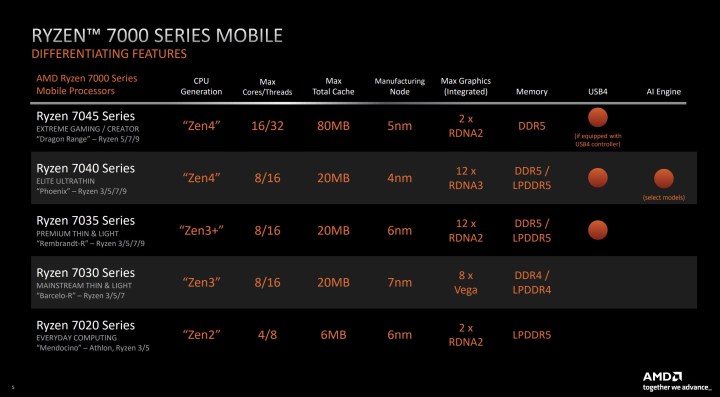New benchmarks suggest that there’s a lot to be excited about if you’re a laptop gamer. The leaked tests show off the performance of the upcoming AMD Ryzen 9 7845HX, as well as AMD’s latest Ryzen 7040 laptop APU.
The former completely destroyed its predecessor, while the latter proved itself to be a strong alternative to a traditional gaming laptop — perhaps even better than Valve’s Steam Deck.

AMD has a whole lot of new mobile processors set to come out soon, including two lineups of laptop CPUs, as well as new APUs. Today’s benchmarks give us a glimpse into the performance of AMD Ryzen 7045 Dragon Range (enthusiast laptop processors) and AMD Ryzen 7040 Phoenix (the latest APUs).
Let’s start with the 12-core, 24-thread beast that is the Ryzen 9 7845HX, which has a maximum clock speed of 5.2GHz and a TDP that can go above 55 watts. The CPU will soon be found in laptops such as the Alienware M16/M18 or the Lenovo Legion. It’s not quite the best processor in the lineup — that title belongs to the Ryzen 9 7945HX with 16 cores and 32 threads. Regardless, both chips are said to be intensely powerful, and they have the highest core counts ever seen in an AMD laptop chip.
The Ryzen 9 7845HX was tested in PassMark, and as seen above, it’s the fastest chip in the database by far right now. This might change when the Intel Raptor Lake flagship arrives — the Core i9-13980HX is most likely going to be the top laptop processor of this year.
For now, AMD’s Ryzen 9 7845HX reigns supreme with a whopping 46,791 points in the multi-core test and 4,003 points in single-core. This makes it 90% faster in multi-threaded tasks and 17% faster in single-core operations compared to the Ryzen 9 6900HX. Keep in mind that these scores are based on a single benchmark, so the real result might be less impressive, but we’re still looking at massive gains here.

The upcoming Ryzen 7040 APU was tested too, this time by 3DMark Time Spy, and it showed off some rather surprising graphics performance thanks to the updated RDNA 3 technology. It’s equipped with 768 shader cores and can hit clock speeds of up to 2.9GHz in boost mode. That makes it better than the GPU found in the Steam Deck, which belongs to the last-gen RDNA 2 family and sports 512 shader cores.
These numbers translate to better benchmark scores, as shared by Tom’s Hardware. The new AMD APU scored around 3,000 points versus 1,700 for the Steam Deck graphics solution. That’s a huge gain, but we have to keep in mind that the Steam Deck runs a much smaller screen than a typical laptop will. Steam Deck only has a resolution of 1,280 x 800, while the APU will be found in laptops that are at least 1080p.
Most gamers will still aim to buy one of the new laptops with Ryzen 7045 chips instead of the Phoenix APU, but if you want a balanced and lightweight device, it seems that the use of RDNA 3 graphics gave the Ryzen 7040 a huge boost that might make it more than adequate for some less-demanding games. The Ryzen 9 7845HX makes a strong alternative for pure
Editors' Recommendations
- AMD’s upcoming APUs might destroy your GPU
- Nice try, Intel, but AMD 3D V-Cache chips still win
- AMD’s new CPU slammed as ‘anti-consumer at best’
- AMD’s new CPUs let you play Cyberpunk without a graphics card
- AMD’s new integrated graphics might beat popular Nvidia GPU





